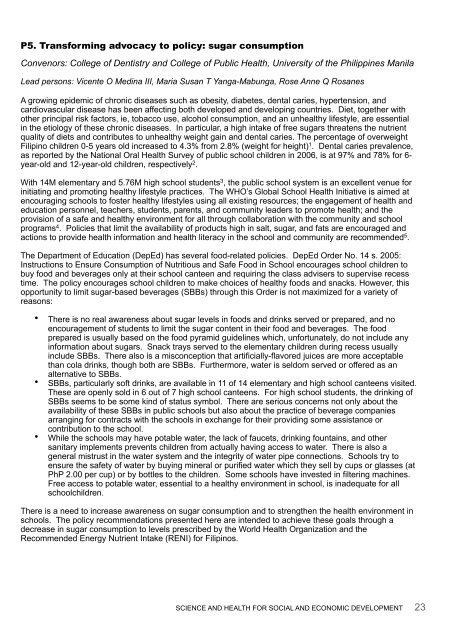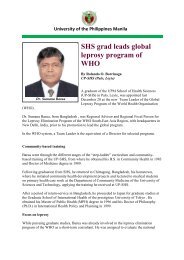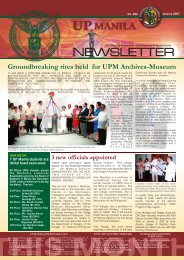NIH 2013 Program - University of the Philippines Manila
NIH 2013 Program - University of the Philippines Manila
NIH 2013 Program - University of the Philippines Manila
Create successful ePaper yourself
Turn your PDF publications into a flip-book with our unique Google optimized e-Paper software.
P5. Transforming advocacy to policy: sugar consumption<br />
Convenors: College <strong>of</strong> Dentistry and College <strong>of</strong> Public Health, <strong>University</strong> <strong>of</strong> <strong>the</strong> <strong>Philippines</strong> <strong>Manila</strong><br />
Lead persons: Vicente O Medina III, Maria Susan T Yanga-Mabunga, Rose Anne Q Rosanes<br />
A growing epidemic <strong>of</strong> chronic diseases such as obesity, diabetes, dental caries, hypertension, and<br />
cardiovascular disease has been affecting both developed and developing countries. Diet, toge<strong>the</strong>r with<br />
o<strong>the</strong>r principal risk factors, ie, tobacco use, alcohol consumption, and an unhealthy lifestyle, are essential<br />
in <strong>the</strong> etiology <strong>of</strong> <strong>the</strong>se chronic diseases. In particular, a high intake <strong>of</strong> free sugars threatens <strong>the</strong> nutrient<br />
quality <strong>of</strong> diets and contributes to unhealthy weight gain and dental caries. The percentage <strong>of</strong> overweight<br />
Filipino children 0-5 years old increased to 4.3% from 2.8% (weight for height) 1 . Dental caries prevalence,<br />
as reported by <strong>the</strong> National Oral Health Survey <strong>of</strong> public school children in 2006, is at 97% and 78% for 6year-old<br />
and 12-year-old children, respectively 2 .<br />
With 14M elementary and 5.76M high school students 3 , <strong>the</strong> public school system is an excellent venue for<br />
initiating and promoting healthy lifestyle practices. The WHO’s Global School Health Initiative is aimed at<br />
encouraging schools to foster healthy lifestyles using all existing resources; <strong>the</strong> engagement <strong>of</strong> health and<br />
education personnel, teachers, students, parents, and community leaders to promote health; and <strong>the</strong><br />
provision <strong>of</strong> a safe and healthy environment for all through collaboration with <strong>the</strong> community and school<br />
programs 4 . Policies that limit <strong>the</strong> availability <strong>of</strong> products high in salt, sugar, and fats are encouraged and<br />
actions to provide health information and health literacy in <strong>the</strong> school and community are recommended 5 .<br />
The Department <strong>of</strong> Education (DepEd) has several food-related policies. DepEd Order No. 14 s. 2005:<br />
Instructions to Ensure Consumption <strong>of</strong> Nutritious and Safe Food in School encourages school children to<br />
buy food and beverages only at <strong>the</strong>ir school canteen and requiring <strong>the</strong> class advisers to supervise recess<br />
time. The policy encourages school children to make choices <strong>of</strong> healthy foods and snacks. However, this<br />
opportunity to limit sugar-based beverages (SBBs) through this Order is not maximized for a variety <strong>of</strong><br />
reasons:<br />
• There is no real awareness about sugar levels in foods and drinks served or prepared, and no<br />
encouragement <strong>of</strong> students to limit <strong>the</strong> sugar content in <strong>the</strong>ir food and beverages. The food<br />
prepared is usually based on <strong>the</strong> food pyramid guidelines which, unfortunately, do not include any<br />
information about sugars. Snack trays served to <strong>the</strong> elementary children during recess usually<br />
include SBBs. There also is a misconception that artificially-flavored juices are more acceptable<br />
than cola drinks, though both are SBBs. Fur<strong>the</strong>rmore, water is seldom served or <strong>of</strong>fered as an<br />
alternative to SBBs.<br />
• SBBs, particularly s<strong>of</strong>t drinks, are available in 11 <strong>of</strong> 14 elementary and high school canteens visited.<br />
These are openly sold in 6 out <strong>of</strong> 7 high school canteens. For high school students, <strong>the</strong> drinking <strong>of</strong><br />
SBBs seems to be some kind <strong>of</strong> status symbol. There are serious concerns not only about <strong>the</strong><br />
availability <strong>of</strong> <strong>the</strong>se SBBs in public schools but also about <strong>the</strong> practice <strong>of</strong> beverage companies<br />
arranging for contracts with <strong>the</strong> schools in exchange for <strong>the</strong>ir providing some assistance or<br />
contribution to <strong>the</strong> school.<br />
• While <strong>the</strong> schools may have potable water, <strong>the</strong> lack <strong>of</strong> faucets, drinking fountains, and o<strong>the</strong>r<br />
sanitary implements prevents children from actually having access to water. There is also a<br />
general mistrust in <strong>the</strong> water system and <strong>the</strong> integrity <strong>of</strong> water pipe connections. Schools try to<br />
ensure <strong>the</strong> safety <strong>of</strong> water by buying mineral or purified water which <strong>the</strong>y sell by cups or glasses (at<br />
PhP 2.00 per cup) or by bottles to <strong>the</strong> children. Some schools have invested in filtering machines.<br />
Free access to potable water, essential to a healthy environment in school, is inadequate for all<br />
schoolchildren.<br />
There is a need to increase awareness on sugar consumption and to streng<strong>the</strong>n <strong>the</strong> health environment in<br />
schools. The policy recommendations presented here are intended to achieve <strong>the</strong>se goals through a<br />
decrease in sugar consumption to levels prescribed by <strong>the</strong> World Health Organization and <strong>the</strong><br />
Recommended Energy Nutrient Intake (RENI) for Filipinos.<br />
SCIENCE AND HEALTH FOR SOCIAL AND ECONOMIC DEVELOPMENT 23




